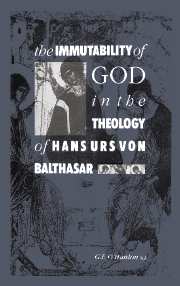Book contents
- Frontmatter
- Contents
- Acknowledgements
- Abbreviations
- Introduction
- 1 Christ and God's immutability
- 2 Creation and God's immutability
- 3 Time, eternity and God's immutability
- 4 Is the trinitarian God immutable?
- 5 Balthasar and other approaches
- 6 Final assessment
- Notes
- Bibliography
- Index of names
- Index of subjects
3 - Time, eternity and God's immutability
Published online by Cambridge University Press: 05 October 2009
- Frontmatter
- Contents
- Acknowledgements
- Abbreviations
- Introduction
- 1 Christ and God's immutability
- 2 Creation and God's immutability
- 3 Time, eternity and God's immutability
- 4 Is the trinitarian God immutable?
- 5 Balthasar and other approaches
- 6 Final assessment
- Notes
- Bibliography
- Index of names
- Index of subjects
Summary
The relationship between time and eternity has emerged as a key explanatory principle in the description of divine immutability. Our aim here is to present a thematic account of this relationship in order to provide us with a means of assessing both Balthasar's overall position on the immutability of God as well as his related positions on the various problematic aspects of the issue which have arisen in the previous two chapters. This thematic account will be limited to those features of the relationship which are pertinent to the immutability issue; we are not presenting Balthasar's comprehensive theology of the relationship between time and eternity.
Two preliminary remarks will help to indicate the nature of the task at hand. First, our mode of being, our categories of thought and expression are so intrinsically temporal that it is notoriously difficult for us to approach this whole matter. Of course in another sense this is but one aspect of the difficulty already referred to concerning any created ‘solution’ to the ‘problem’ of God (see pp. 85–7 above) – the basic thrust of all such solutions must lie in the elimination of false ways of speaking about God, and in the choice of less inadequate positive ways of expressing the mysterious relationship between creature and creator. Our aim, then, is to speak correctly about this issue in a way which yields truth that is respectful of mystery and yet wary of semantic mystification. A second introductory comment may prevent one such possible instance of mystification.
- Type
- Chapter
- Information
- Publisher: Cambridge University PressPrint publication year: 1990



